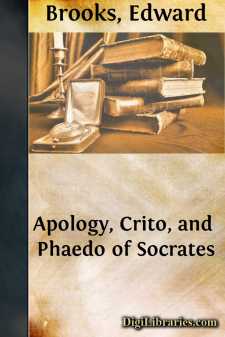Categories
- Antiques & Collectibles 13
- Architecture 36
- Art 48
- Bibles 22
- Biography & Autobiography 813
- Body, Mind & Spirit 142
- Business & Economics 28
- Children's Books 17
- Children's Fiction 14
- Computers 4
- Cooking 94
- Crafts & Hobbies 4
- Drama 346
- Education 46
- Family & Relationships 57
- Fiction 11829
- Games 19
- Gardening 17
- Health & Fitness 34
- History 1377
- House & Home 1
- Humor 147
- Juvenile Fiction 1873
- Juvenile Nonfiction 202
- Language Arts & Disciplines 88
- Law 16
- Literary Collections 686
- Literary Criticism 179
- Mathematics 13
- Medical 41
- Music 40
- Nature 179
- Non-Classifiable 1768
- Performing Arts 7
- Periodicals 1453
- Philosophy 64
- Photography 2
- Poetry 896
- Political Science 203
- Psychology 42
- Reference 154
- Religion 513
- Science 126
- Self-Help 84
- Social Science 81
- Sports & Recreation 34
- Study Aids 3
- Technology & Engineering 59
- Transportation 23
- Travel 463
- True Crime 29
Apology, Crito, and Phaedo of Socrates
by: Edward Brooks
Categories:
Description:
Excerpt
Introduction.
Of all writers of speculative philosophy, both ancient and modern, there is probably no one who has attained so eminent a position as Plato. What Homer was to Epic poetry, what Cicero and Demosthenes were to oratory, and what Shakespeare was to the drama of England, Plato was to ancient philosophy, not unapproachable nor unapproached, but possessing an inexplicable but unquestioned supremacy.
The authentic records of his life are meagre, and much that has been written concerning him is of a speculative nature. He was born at Athens in the year 427 B.C. His father's name was Ariston, and his mother's family, which claimed its descent from Solon, included among its members many Athenian notables, among whom was Oritias, one of the thirty tyrants.
In his early youth Plato applied himself to poetry and painting, both of which pursuits he relinquished to become the disciple and follower of Socrates. It is said that his name was originally Aristocles, but that it was changed to Plato on account of the breadth of his shoulders and forehead. He is also said to have been an expert wrestler and to have taken part in several important battles.
He was the devoted friend and pupil of Socrates, and during the imprisonment of his master he attended him constantly, and committed to writing his last discourses on the immortality of the soul.
After the death of Socrates it is supposed that Plato took refuge with Euclides in Megara, and subsequently extended his travels into Magna Graecia and Egypt.
Upon his return to Athens he taught those who came to him for instruction in the grove named Academus, near the Cephisus, and thus founded the first great philosophical school, over which he continued to preside until the day of his death. Above the entrance to this grove was inscribed the legend: "Let no one ignorant of geometry enter here." Here he was attended by persons of every description, among the more illustrious of whom were Aristotle, Lycurgus, Demosthenes and Isocrates.
There is a story to the effect that Plato three times visited Sicily, once upon the invitation of the elder Dionysius, and twice at the earnest solicitations of the younger. The former he is said to have so seriously offended as to cause the tyrant to have him seized on his return home and sold as a slave, from which state of bondage he was, however, released by Anicerius of Cyrene.
The people of his time thought more of him than they did of all their other philosophers, and called him the Divine Plato. So great was the regard and veneration for him that it was considered better to err with Plato than be right with any one else.
The writings of Plato are numerous, and most of them are in the form of dialogues. The following pages contain translations of three of his works, viz.: "The Apologia," "The Crito" and "The Phædo," all of which have reference to the trial, imprisonment and death of Socrates.
"The Apologia" represents Socrates on trial for his life, undertaking his own defence, though unaccustomed to the language of the courts, the occasion being, as he says, the first time he has ever been before a court of justice, though seventy years of age....


